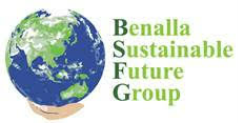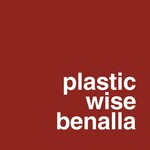Plastic Wise Benalla, an action group of BSFG, is made up of community volunteers working to reduce the impact of single use plastic on our community and raise awareness about sustainable alternatives to plastic.
If we put in a little thought and effort we can all reduce our impact of microfibres on the environment.
Some ideas to reduce the impact of microfibres*-
"1. Buy less and buy natural Do you really need yet another new polar fleece jacket or blanket? When possible, consider shifting your purchase choices to natural fibers like organic cotton.
2. Use a front-loading washing machine instead of a top loading washing machine Front loading washing machines shed way less (7X less) microfibers than top-loaders
3. Wash less, and when you do use cool water A little campfire smell only gives your clothing more character. Washing with cool water won’t make that much of a difference in how clean your clothes come out, and it will avoid the additional shedding from hot water breaking up the fibers.
4. Do not wash with solid items (like shoes or backpacks) Heavy items lead to more friction, which means more fibers breaking during washing and ending up in the ocean.
5. Separate soft textiles and hard textiles The goal is to have less agitation in the washer and dryer, so separate out the heavy clothing from light clothing.
6. Avoid using a tumble dryer, air dry instead Synthetic clothing air dries fast anyway and the dryer may also contribute to microfiber release.
7. Reduce rotation speed when washing Skip the spin cycle to prevent additional friction from causing more fibers to break.
8. Wash for a shorter amount of time The more time in the washer, the more chances for microfibers to escape.
9. Use less detergent and without bleach Liquid detergent is best and use it sparingly.
10. Consider using a filter/microfiber system Though these devices are not an end-all solution, they provide an intermediate option to reduce the amount of microfibers that go down the drain, and are great ways to raise awareness about the issue. The Guppyfriend is a bag that you place your synthetic clothes in when you wash them. It catches microfibers that may shed from synthetic clothing, but more importantly it reduces the level of agitation in the washer, a significant factor in microfiber release. The best solution to catch microfibers in your laundry is an actual filter attached to your washer. Recent studies have shown that filters like Lint LUV-R and Filtrol 160 have a catchment rate of up to 87% of microfibers."
*Source: Bills and Best Practices for Microfiber Pollution Solutions (2019) accessed 24/4/2022
2. Use a front-loading washing machine instead of a top loading washing machine Front loading washing machines shed way less (7X less) microfibers than top-loaders
3. Wash less, and when you do use cool water A little campfire smell only gives your clothing more character. Washing with cool water won’t make that much of a difference in how clean your clothes come out, and it will avoid the additional shedding from hot water breaking up the fibers.
4. Do not wash with solid items (like shoes or backpacks) Heavy items lead to more friction, which means more fibers breaking during washing and ending up in the ocean.
5. Separate soft textiles and hard textiles The goal is to have less agitation in the washer and dryer, so separate out the heavy clothing from light clothing.
6. Avoid using a tumble dryer, air dry instead Synthetic clothing air dries fast anyway and the dryer may also contribute to microfiber release.
7. Reduce rotation speed when washing Skip the spin cycle to prevent additional friction from causing more fibers to break.
8. Wash for a shorter amount of time The more time in the washer, the more chances for microfibers to escape.
9. Use less detergent and without bleach Liquid detergent is best and use it sparingly.
10. Consider using a filter/microfiber system Though these devices are not an end-all solution, they provide an intermediate option to reduce the amount of microfibers that go down the drain, and are great ways to raise awareness about the issue. The Guppyfriend is a bag that you place your synthetic clothes in when you wash them. It catches microfibers that may shed from synthetic clothing, but more importantly it reduces the level of agitation in the washer, a significant factor in microfiber release. The best solution to catch microfibers in your laundry is an actual filter attached to your washer. Recent studies have shown that filters like Lint LUV-R and Filtrol 160 have a catchment rate of up to 87% of microfibers."
*Source: Bills and Best Practices for Microfiber Pollution Solutions (2019) accessed 24/4/2022
Links:
'Ten for the Ocean - washing guide to prevent microfibre shedding'
You'll Never Want to Buy Synthetic Clothing After Watching 'The Story of Microfibers'
How Sustainable is Polar Fleece?
'Ten for the Ocean - washing guide to prevent microfibre shedding'
You'll Never Want to Buy Synthetic Clothing After Watching 'The Story of Microfibers'
How Sustainable is Polar Fleece?
If you would like to be involved with Plastic Wise Benalla please contact Wendy Baker - [email protected]
|
|
Benalla Sustainable Future Group acknowledges the traditional owners of the land on which we live, work and meet, the Taungerang, Yorta Yorta and Bpangerang people
of North East Victoria, and pay our respects to their elders past, present and emerging.
of North East Victoria, and pay our respects to their elders past, present and emerging.




